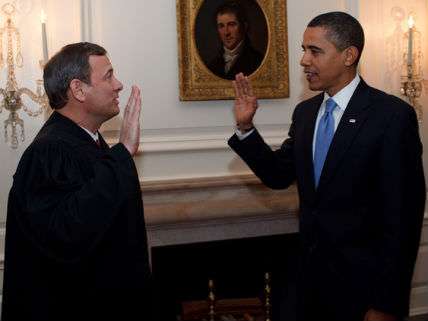No, Chief Justice John Roberts Is Not a 'Secret Liberal'
The chief justice is a legal conservative who sometimes practices judicial deference.

"Is Chief Justice John Roberts a secret liberal?" asks the provocative headline attached to an article at FiveThirtyEight. Spoiler alert: The article is dumb and the answer is "no."
According to FiveThirtyEight's Oliver Roeder, while it is "relatively early in Roberts's Supreme Court career…he is beginning to fit the historical pattern, at least quantitatively, of an ideological defector."
What's the evidence of this alleged defection? Here is a representative sample of Roeder's argument:
The case for a liberal John Roberts starts with his 2012 decision that determined the fate of the Affordable Care Act. The chief justice was widely expected to vote to kill the law—the crown jewel of the Democratic president whom he'd sworn into office three years earlier. Instead, he performed some contorted judicial yoga, declaring that the law's individual mandate was a constitutionally allowed tax, siding with the liberal bloc and saving Obamacare.
You may have noticed that Roeder makes a foundational error at the outset. He confuses the outcome of a case with the legal reasoning that led to that outcome. The problems only grow from there.
In a manner of speaking, yes, National Federation of Independent Business v. Sebelius does count as a "liberal" win, because the liberal Obama administration won. But why did the liberal side win? What did the Court actually say in its decision?
Before I get into that, let me go back to Roeder's assertion that "the chief justice was widely expected to vote to kill the [health care] law."
Not everyone back then was so sure that Roberts would "kill the law." Seven months before the Supreme Court heard oral arguments in the Obamacare case, I wrote the following: "Roberts may very well uphold the health care law as an act of judicial restraint."
I wrote that because it seemed to me that Roberts came from the school of legal conservatism that puts serious stock in the doctrine of judicial restraint, or judicial deference—the idea that judges should defer to the democratic branches of government whenever possible, nullifying duly enacted laws on only the rarest of occasions. As the conservative legal icon Robert Bork liked to put it, "let the majority have its way." It also seemed to me that this deferential doctrine was going to play an important role in the looming SCOTUS showdown over heath care and that Roberts would be the one to watch on that front.
So why did the liberal side win the case? Or, more accurately, why did the conservative chief justice vote to uphold the health care law?
Here is what Roberts had to say for himself: "It is not our job to protect the people from the consequences of their political choices." In short: Roberts made the familiar argument for judicial deference.
As it happens, Roberts did the same thing in 2015 when he urged judicial deference to Congress in the follow-up Obamacare case King v. Burwell ("in every case we must respect the role of the legislature"). Roberts did it again in 2015, when he urged judicial deference to state legislatures in the gay marriage case Obergefell v. Hodges ("this Court is not a legislature"). In the Obamacare case, judicial deference meant that the "liberals" won. With gay marriage, judicial deference would have meant a win for the "conservative" side. Once again, the outcome of a case is one thing; the legal reasoning behind it is something else.
To summarize, Chief Justice Roberts is not an "ideological defector." He is a legal conservative who has a habit of invoking judicial deference, which is an idea that he and many other legal conservatives have been championing for years. There is nothing "secret" about this.


Show Comments (99)